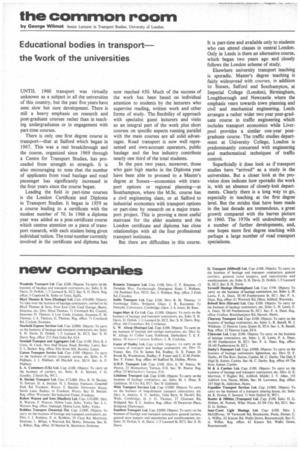the common room
Page 48

If you've noticed an error in this article please click here to report it so we can fix it.
by George Wilmot Senior Lecturer in Transport Studies, University of London.
Educational bodies in transportthe Work of the universities
UNTIL 1960 transport was virtually unknown as a subject in all the universities of this country, but the past five years have seen slow but sure development. There is still a heavy emphasis on research and post-graduate courses rather than in teaching undergraduates or in engagement with part-time courses.
There is only one first degree course in transport-that at Salford which began in 1967. This was a real breakthrough and the course, organized since 1969 through a Centre for Transport Studies, has proceeded from strength to strength. It is also encouraging to note that the number of applicants from road haulage and road passenger has significantly increased in the four years since the course began.
Leading the field in part-time courses is the London Certificate and Diploma in Transport Studies. It began in 1959 as a course leading to a certificate with the modest number of 70. In 1966 a diploma year was added as a post-certificate course which centres attention on a piece of transport research, with each student being given individual tuition. The total number currently involved in the certificate and diploma has now reached 450. Much of the success of the work has been based on individual attention to students by the lecturers who supervise reading, written work and other forms of study. The flexibility of approach with specialist guest lecturers and visits as an integral part of the work plus short courses on specific aspects running parallel with the main courses are all solid advantages. Road transport is now well represented and own-account operators, public haulage and the bus industry contribute nearly one third of the total students.
In the past two years, moreover, those who gain high marks in the Diploma year have been able to proceed to a Master's degree at Sussex-economics with transport options or regional planning-at Southampton, where the M.Sc. course has a civil engineering slant, or at Salford to industrial economics with transport options or part-time by research on a major transport project. This is proving a most useful staircase for the abler students and the London certificate and diploma has close relationships with all the four professional transport institutes.
But there are difficulties in this course. It is part-time and available only to students who can attend classes in central London. Only in Leeds is there an alternative course, which began two years ago and closely follows the London scheme of study.
Elsewhere university transport teaching is sporadic." Master's degree teaching is fairly widespread with courses. in addition to Sussex, Salford and Southampton; at Imperial College (London), Birmingham, Loughborough and Newcastle where the emphasis veers towards to planning and civil and mechanical engineering. Leeds arranges a rather wider two year post-graduate course in traffic engineering which includes transport economics while Liverpool provides a similar one-year postgraduate course. The traffic studies department at University College, London is predominantly concerned with engineering and mathematical techniques of traffic control.
Superficially it does look as if transport studies have "arrived" as a study in the universities. But a closer look at the provision does indicate how sporadic the work is, with an absence of closely-knit departments. Clearly there is a long way to go, especially in teaching at the first degree level. But the strides that have been made in the last decade are tremendous, a great growth compared with the barren picture in 1960. The 1970s will undoubtedly see a number of further developments, and, one hopes more first degree teaching with perhaps a large number of road transport specialisms.




















































































